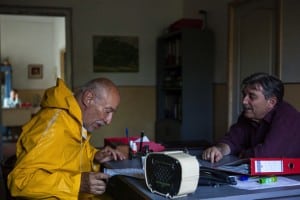Dir: Radu Muntean | Drama | Romania | 105′
Romanian New Wave director Radu Muntean follows his existential thriller One Floor Below (2015) with a similarly slow-burning contemporary portrait of narcissism and disenchanted Bucharest youth premiering at Locarno Film Festival 2018.
Drawing comparison with Uli Edel’s Christiane F, teenage Alice T is pretty, petulant and out of control. Adopted as a baby from a Rumanian orphanage she is constantly finding ways to market herself for personal empowerment and spends her directionless days hanging out with mindless friends, taking selfies, a cigarette casually in her hand. Their focus is on boys and soon Alice is pregnant, sparking a furious row with her adoptive mother (Mihaela Sirbu from Aferim!) who suffered to have her own kids but now accepts her daughter’s right to have the baby. Spurred on by this petty victory against her mother, Alice at first feels more in control; she has a weapon against her mother, a new identity and a mission to accomplish – that of motherhood. Her mother warms to the pregnancy and gradually the family are on board supporting her too. Alice finally feels she’s got somewhere with her life, but soon becomes bored with the idea of having a baby which may take the focus off number one.
Andra Guti is really impressive in her debut as Alice and Muntean, writing with two regular male collaborators (who are all fathers), keeps his distance from his anti-heroine as the observational story gradually unspools. What starts as a sad reflection on modern womanhood and the loss of feminine could have transformed into something warmer and more mature on Alice’s part. But that’s not the point. And soon her abusive narcissism resurfaces as she casts around for more attention, another power fix. This transformation is so subtle it takes a while to fully take on board the true depth of Alice’s self-centredness as the prime focus of her mother’s doting and undivided attention, calling to mind that same dedication seen by the mother in fellow Romanian Calin Peter Netzer’s 2013 drama Child’s Pose.
This female centric storyline highlights the focus on domestic trivia where low level issues form the centre of everyday conversations. The camera hangs over these scenes to the point of tedium, emphasising the sheer vacuousness of Alice’s existence. There are no hopes or dreams for anything outside this narrow domain. And Alice is not encouraged to aspire but shielded from any kind of challenge, so she is unable to learn by her mistakes on a road to nowhere. Her bad reports at school are openly questioned by her mother in the face of authority, pointing to a system where children can do no wrong, but will never really amount to anything. After the pregnancy is confirmed, her mother decides that her daughter will take some time out for the pregnancy, but this only leaves more of a vacuum in the teenager’s feckless existence and she needs to be the centre of attention.
Tudor Lucaciu’s camera pictures the scene around Bucharest and the coast in master shots and long takes showing how Alice can be anything to anybody as she casts her spell over strangers and acquaintances alike. The male characters remain unexplored and are mostly seen as bemused outsiders just trying to get on with their lives. And the finale comes as a fait accompli leaving Alice just as bewildered and lost as she must have felt back in that orphanage, and even less sure of herself than she was at the start. This is a drama that will make your blood boil. MT
IN COMPETITION | LOCARNO FILM FESTIVAL 1-11 AUGUST 2018 | Due to release next year in the UK

